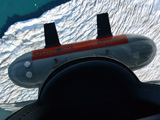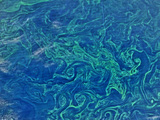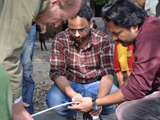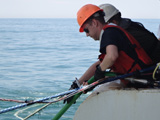Research
Lamont-Doherty Earth Observatory has been a leader in the study of our planet since its founding in 1949, with a tradition of pushing the frontiers of knowledge. More than 200 Ph.D. level researchers work and teach at Lamont. About 90 graduate students are involved in research and a growing number of undergraduates participate in internships.
Lamont also operates a federally funded research ship, the Marcus G. Langseth, which scientists use to collect seismic images of the crust and mantle beneath the seafloor and sediment cores to study past climate change. Among the Observatory’s many labs, the Gary C. Comer Geochemistry Building and Core Laboratory host state-of-the-art analytical facilities in geochemistry and biogeoscience, and the Integrated Earth Data Applications Center provides marine and geochemical data to the global science community. Throughout the Observatory, scientists develop innovative instrumentation and software to image, sample, analyze, and model the planet’s atmosphere, ice sheets, oceans, and interior.
Explore the research highlights below to learn more about the global reach of Lamont scientists’ work and what they’re discovering about our planet.

 Assessing Extreme Weather Risk
Assessing Extreme Weather Risk The Drought-Climate Connection
The Drought-Climate Connection Migration & the Syria Conflict
Migration & the Syria Conflict Ice Sheets & Sea Level Rise
Ice Sheets & Sea Level Rise Keeping Oceans Healthy
Keeping Oceans Healthy Earth, Air & Human Health
Earth, Air & Human Health Exploring Beneath the Sea Floor
Exploring Beneath the Sea Floor